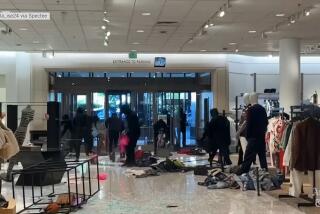One Firm Cashes In by Virtue of Its Simplicity
- Share via
One of the beauties of the huge, complex U.S. economy is that a smart business can make it seem so simple.
If, for instance, you’re worried about old-fashioned American ingenuity or ability to manufacture--or that economic recovery will bring higher inflation--then relax and consider Newell Co. of Freeport, Ill.
Newell is a remarkably successful, 90-year-old company that started out in curtain rods and still supplies simple, everyday products such as Wearever pots and pans, Levolor window blinds and Stuart Hall school notebooks to those mass-market chains that each year prove to be the fastest-growing retailers in America: Wal-Mart, Kmart, Home Depot and the Target division of Dayton Hudson.
And just as those chains have transformed the American general store--with low prices on great varieties of merchandise--so Newell has transformed the many small companies it has acquired in the last two decades, enabling them to meet the growing demands of big retailers.
Newell’s story confirms many of the virtues and explains many of the tensions of U.S. business today--and also offers insight into what constitutes a successful investment.
The first thing to understand is that modern mass retailers are truly giants--Wal-Mart has more than $65 billion in annual sales, Kmart over $40 billion. Those companies don’t want suppliers simply to deliver merchandise to their warehouses. They want suppliers to keep their inventory, cancel slow-moving products, keep new ones coming.
They demand an extraordinary level of computing power, more than many small manufacturers can keep up with. But Newell, now at $2 billion in annual sales, can handle the job. Newell hooks into its customers’ computerized inventory systems and then keeps track of when paint brushes or picture frames or any of its 17 product lines are running low. “The retailers demand that we not only keep them up to date but plan promotions to move our merchandise,” says William Alldredge, Newell’s vice president for finance.
The distribution is high-tech but the products are low-tech. Newell started out in 1903 making drapery rods for sale at five-and-dime stores such as Woolworth and S.S. Kresge--the forerunner of Kmart. It began acquiring other manufacturers of household products in the late 1960s, when Chairman Daniel Ferguson, who has now retired but retains his title, saw the need for a bigger company to deal with the kind of retail chains the late Sam Walton and California’s Sol Price were building.
Newell deals in “staple products, so there’s not much fashion or rapid product change to worry about,” says analyst William Steele of the Dean Witter brokerage firm.
The worry is keeping costs low. Newell modernizes production at its acquired companies, often reducing the number of styles and colors offered in window handles or build-it-yourself shelf materials.
But, aiming to grow the business, Newell doesn’t cut back on production. And almost all its products continue to be manufactured in the United States. The need for prompt delivery to big customers like Home Depot, True Value and Ace Hardware argues against running for cheap production overseas.
Economies are made in the front office. Newell centralizes all finance and administration, including bank accounts for its divisions. “We expect division presidents to be out visiting customers’ offices or in their stores,” Alldredge says.
“They make more money on a humble skillet than any company I know,” says analyst Laurance Baker of Legg Mason Wood Walker, a Baltimore-based regional brokerage. Indeed, Newell regularly earns 20% on its shareholders’ equity--a level reached only by the top companies in any industry--and 11 cents on each sales dollar.
It’s a frugal company, not given to fancy offices and big salaries; management and directors own 13% of the stock instead. Newell’s ratio of general and administrative expenses is lower even than that of super-thrifty Wal-Mart.
What does Newell’s example tell us? That price disinflation in the broad economy will remain the trend. Shoppers are willing to buy window shades and frying pans, but they’re unwilling to pay extra for them. That’s why mass-market retailers--who used to be called discounters--are growing much faster than other kinds of stores.
Newell’s example also tells us that a consumer economy, driven by aggressive companies striving to deliver bargain goods to a mass market, can spur technological innovations such as the electronic data interchange linking Newell to its customers.
And it tells us that a relatively small company, based between the Mississippi River and Rockford, Ill., can attract and reward major investors. Pension funds own roughly 65% of Newell stock, which has multiplied more than 40 times in value in the last 20 years.
It’s the kind of company, in short, that master investors Peter Lynch and Warren Buffett are talking about when they say--contradicting the enthusiasm of some investment experts for foreign stock markets--that the greatest values can be found here at home.
More to Read
Inside the business of entertainment
The Wide Shot brings you news, analysis and insights on everything from streaming wars to production — and what it all means for the future.
You may occasionally receive promotional content from the Los Angeles Times.










